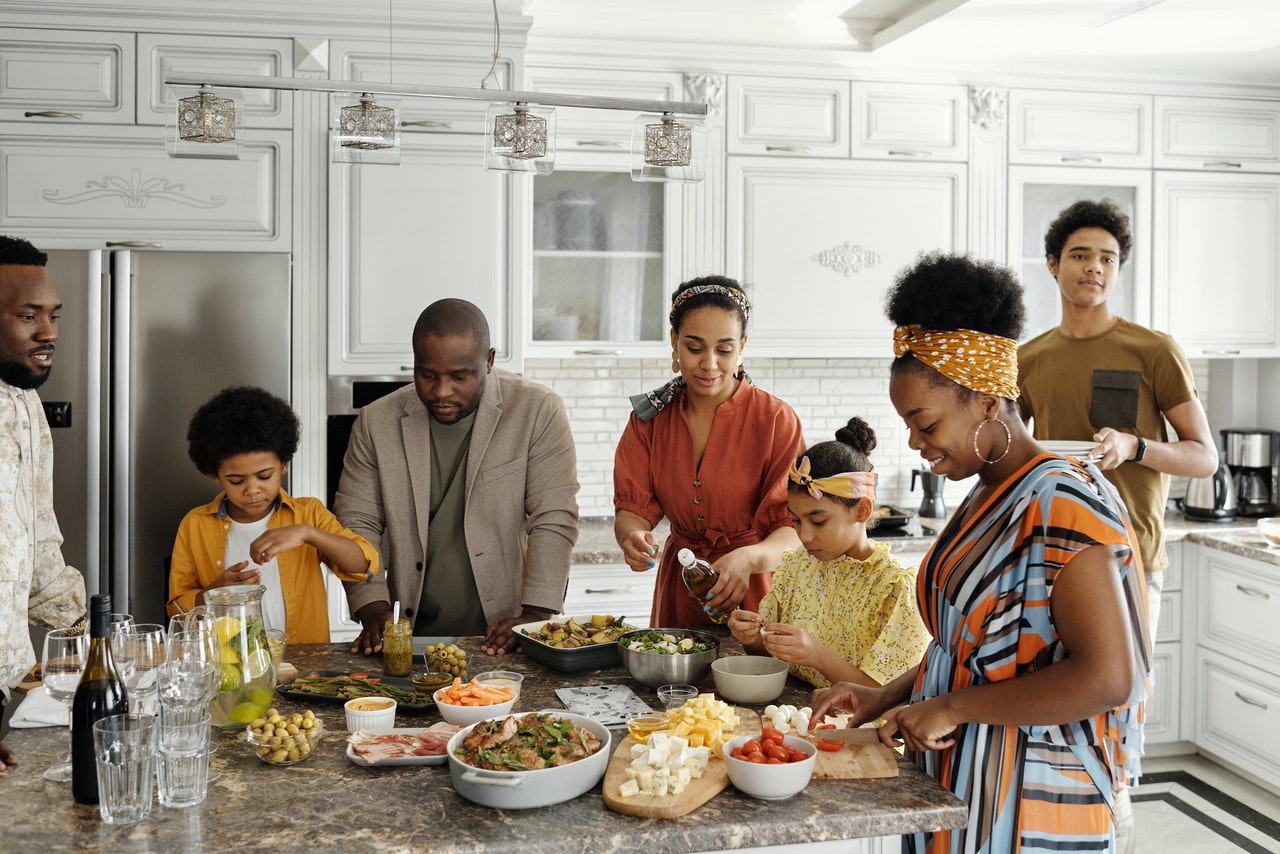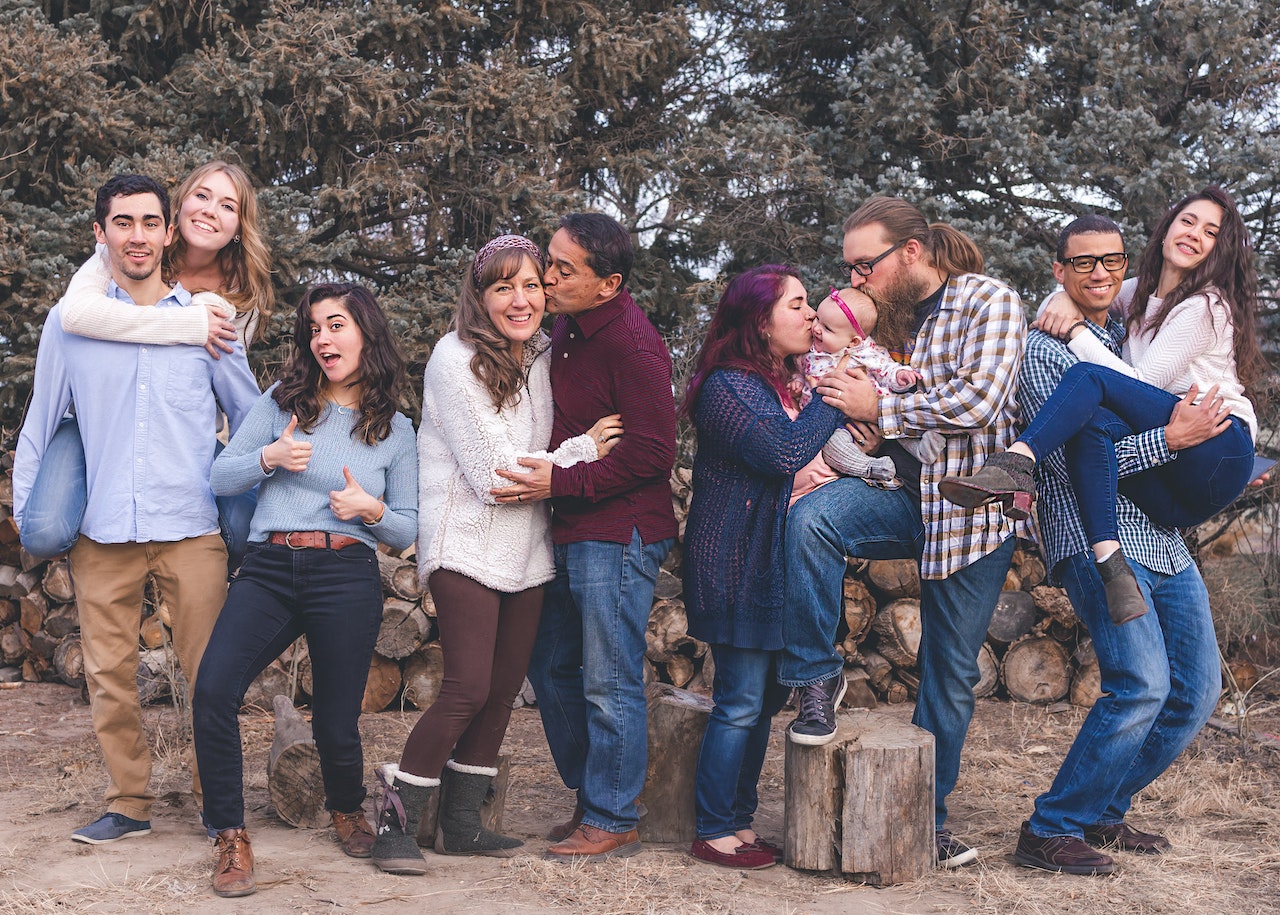In today’s post, we’re talking all about big families: the advantages and disadvantages of having a big family, and your big family questions answered!
It’s no secret that big families come with their own set of unique joys and challenges.
Whether you’re a parent of one or ten, it can be tough to keep track of everything in your big family. From coordinating schedules to finding enough space for everyone, there are plenty of challenges in a big family.
Luckily, there are also plenty of joys to go around.
From the shared laughter around the dinner table to the sense of security and support that comes from knowing you’re never alone, there are plenty of reasons to love a big family.
Today, we’ll take a detailed look at the lives of big families and things to consider as well as the unique challenges they face.
If you want to understand what the life of big families feels like, read on to know more!

How Many is a Big Family?
Usually, a family with more than three children is considered a “big family.”
In some cases, it may also refer to a family with multiple generations living under one roof.
Whatever the definition, a big family typically requires more space, more resources, and more patience than a smaller one. But they also tend to be louder, messier, and more chaotic.
There are also more chances for conflict, but also more chances for love and laughter. In many ways, a big family is like a microcosm of the world.
It can be difficult to manage, but it’s also full of potential.
Which is correct: big family or large family?
Technically speaking, big often refers to the physical size of an object, such as a big house, or big television. Big can also refer to something that is weighty and important (milestone moments in life are often considered “big” moments).
Large usually only refers to the physical size of something and is often used less often than “big”. Both terms are used interchangeably for the most part.
This being said, you can call a family a “big family” or a “large family” without being wrong.
What’s It Like Having a Big Family?
As someone who comes from a large family (I’m the oldest of four siblings), I can tell you that there are many advantages to a big family!
Of course, just like everything, there are some possible disadvantages, too. Let’s talk through a few of the main advantages and disadvantages of a big family…

Advantages of a Big Family
Imagine waking up to the sound of giggles and cheerful talks (well, on the good days only).
This is the coziness a family brings to your life by making you feel relevant, loved, and cherished.
But besides the love-filled relations a family usually consists of, here are some often overlooked advantages of big families:
There Is Always Someone To Spend Time With
Cozy family gatherings around the dinner table, late-night talks with your siblings while sharing a bed on road trips – are just some of the priceless moments that can only be experienced when living in a big happy family.
Unlike living alone or with roommates, you always have someone to spend time with and talk to when living in a big happy family.
Even though arguments are bound to happen between siblings or between parents and children, there is always a sense of love and togetherness in a big happy family.
In tough times, family members will rally around each other and offer support, and in good times, everyone can enjoy each other’s company.
There is Built-In Support and Assistance
One of the biggest plus points of big families is the sense of support and community that comes from being surrounded by loved ones.
In a big family, there is always someone to lend a hand with childcare, cooking, errands, or any other need. Members of a large family are also quick to offer emotional support during tough times.
Knowing that you have such a strong network of people to rely on can be a great source of comfort and strength.
Children in Larger Families Learn to Share
In today’s world, it’s not uncommon for children to grow up in small families.
With only one or two siblings, they may never learn the essential life lessons that come from sharing.
However, children who grow up in larger families often have different experiences. From an early age, they learn to share everything from toys to parents’ attention.
As they grow older, they continue to share their space and resources. This can result in some challenges, but it also teaches them important skills like cooperation and negotiation.
Families With More Children Tend to Be Closer-Knit
While it is certainly not true in all cases, families with more children tend to be closer-knit. With more kids comes more noise, messes, and chaos—but also more laughter, love, and memories.
There is always someone to play with in a larger family, whether it’s a game of tag in the backyard or a pillow fight in the living room. And when times are tough, siblings can be a source of comfort and support.
Of course, raising a family is never easy, but it can be especially challenging for parents of large families.
However, they would likely tell you that it is all worth it. After all, there is no greater joy than watching your children grow into happy and caring adults.

Disadvantages of a Big Family
Sure, big families look great in pictures and their festive times also look fun-filled.
But, it’s not always hunky-dory, especially when there are financial issues and personality clashes.
So, it’s only fair to discuss the major downsides of big families.
Less One-On-One Time For Each Child With Parents
In families with several children, it’s not uncommon for each parent to feel stretched thin.
As a result, each child may have less one-on-one time with their mom or dad. While this can be tough on kids, it’s important to remember that all families are different, and there is no one “right” way to parent.
In fact, research has shown that children in large families often benefit from having a wide social network and developing independent skills at an early age.
Of course, every child is different, and some may thrive with more one-on-one attention. But ultimately, it’s up to each family to find what works best for them.
It’s More Expensive To Support A Large Family
For parents, raising a large family can be both expensive and exhausting.
With more children comes more expenses, from food and clothing to education and child care. And as any parent knows, children require a lot of time and energy.
From dealing with tantrums and homework to soccer practice and field trips, parents of large families often find themselves running on empty.
Of course, there are also many rewards to raising a big family. Seeing all your children grow and succeed is one of the most rewarding experiences a parent can have.
And despite the challenges, most parents of large families wouldn’t have it any other way.
It’s Difficult to Keep Everyone Organized and On Track
Anyone who has ever tried to herd a group of children knows that it can be a challenge to keep everyone organized and on track.
This is especially true for parents of large families. With so many kids to keep track of, it’s easy for things to quickly go off the rails.
From mismatched socks to forgotten homework, there always seems to be something that can trip up even the most well-organized parent.
Big Families Are More Likely To Have Arguments And Disagreements
Any family is likely to experience the occasional argument or disagreement.
However, families with more members may be more prone to conflict due to the greater number of personalities and opinions involved.
In a large family, there are differences of opinion on everything from what to eat for dinner to how to spend a weekend.
And with more people comes more chances for someone to feel left out or excluded.
With so many different personalities in one household, it’s not surprising that arguments and disagreements are more common in large families.
Extended Family
There are many types of large families out there, but one of the most common, yet misunderstood, is an extended family.
Let’s talk about what an extended family is, and the advantages and disadvantages of this type of family unit.
What is an Extended Family
In short, an extended family is a type of family that extends beyond the nuclear family (a nuclear family usually consists of parents, plus the natural children of those parents living together in a household).
An extended family can include grandparents, aunts, uncles, and other relatives. These relatives all live either in one household together, or nearby.
Extended family units are more common in some parts of the world than others.
You are more likely to see them in areas such as Asia, Southern Europe and Africa, and less likely to have them in North America and Northern Europe.
Extended Family Advantages and Disadvantages
Extended families can be complex, with many advantages and disadvantages.
One advantage is financial. It’s economically beneficial to all when families can live under the same roof and share expenses.
Extended families can also help each other out with childcare, chores, cooking and other household tasks.
Also, extended families often share close bonds as well as cultural values, promoting a tight knit family to weather the ups and downs of life with.
One of the big disadvantages of extended family situations is that there is often a lack of independence.
Because family members depend so highly on each other, it can be hard to break away, be independent and forge your own path.
Many believe that the advantages of extended families outweigh the disadvantages.
Summing Up
Life in a big family is usually full of love, laughter, and chaos. There are always people around to give hugs and lend a helping hand.
However, there can also be a lot of noise, arguments, and confusion.
With so many people living under one roof, it’s important to have good communication and organizational skills.
But for those who enjoy being surrounded by loved ones, a big family can be the perfect place to call home.
Thanks for reading all about Big Family: The Advantages and Disadvantages of Big Families!
Are you part of a big family? If so, I’d love to hear your experience. Please let us know in the comments!
Have a great day!

Ibby
Saturday 13th of May 2023
64, no partner, kids or grandkids. My eldest sibling has that large glowing ball of joy called family. So opposite it hurts.
Big Family: The Advantages and Disadvantages of Big Families – Home Gadget World
Tuesday 10th of May 2022
[…] post Big Family: The Advantages and Disadvantages of Big Families appeared first on Burlap + […]